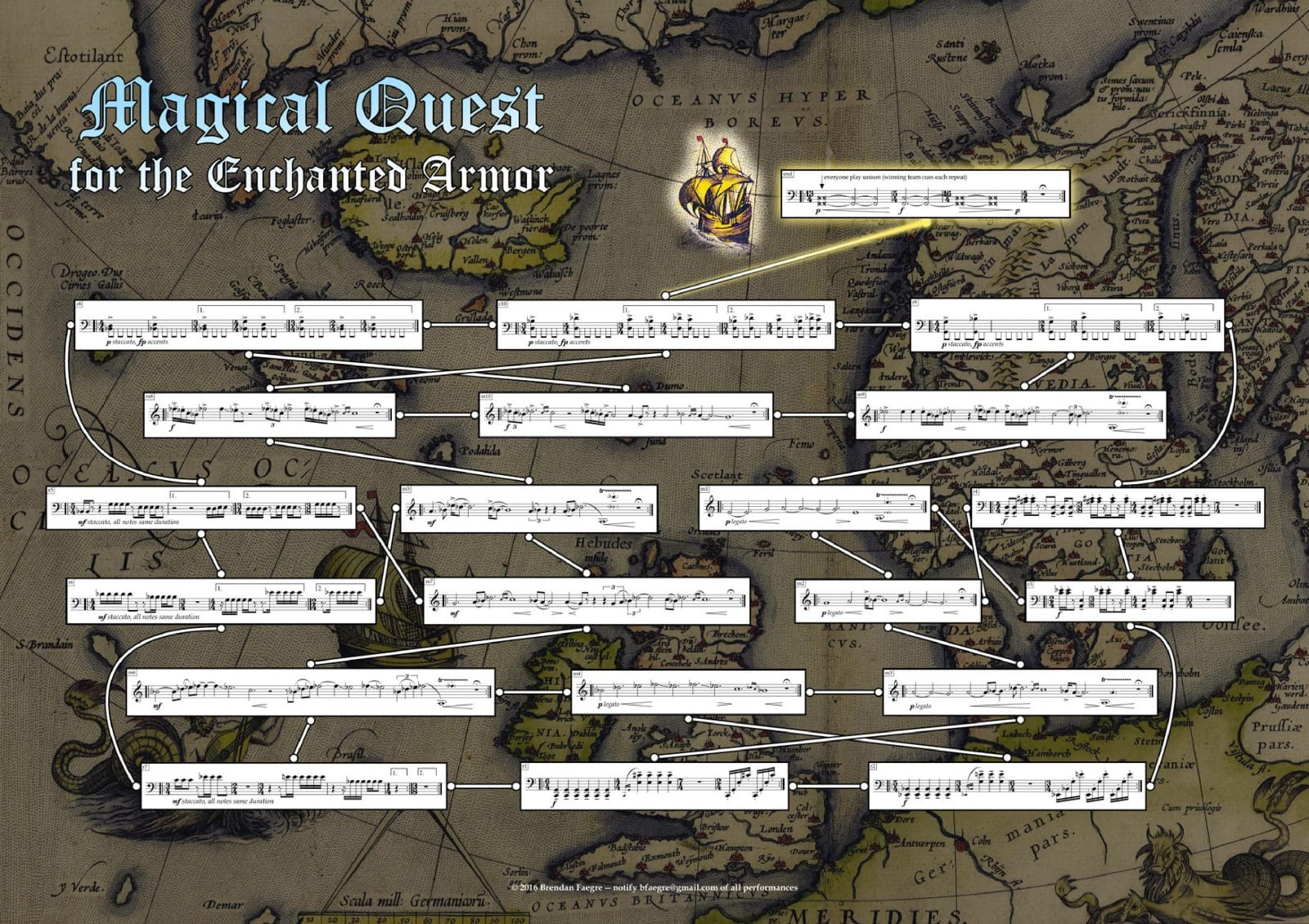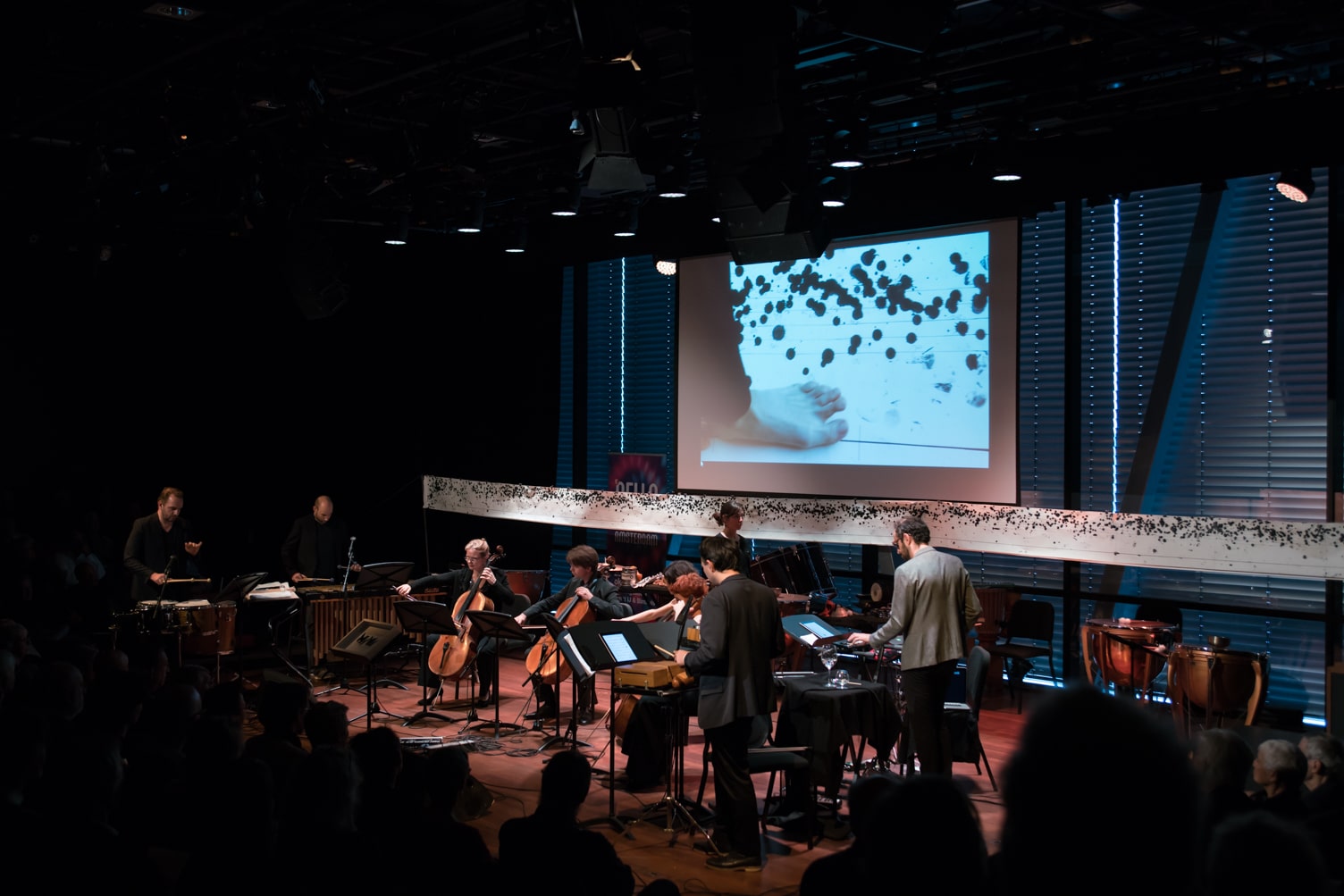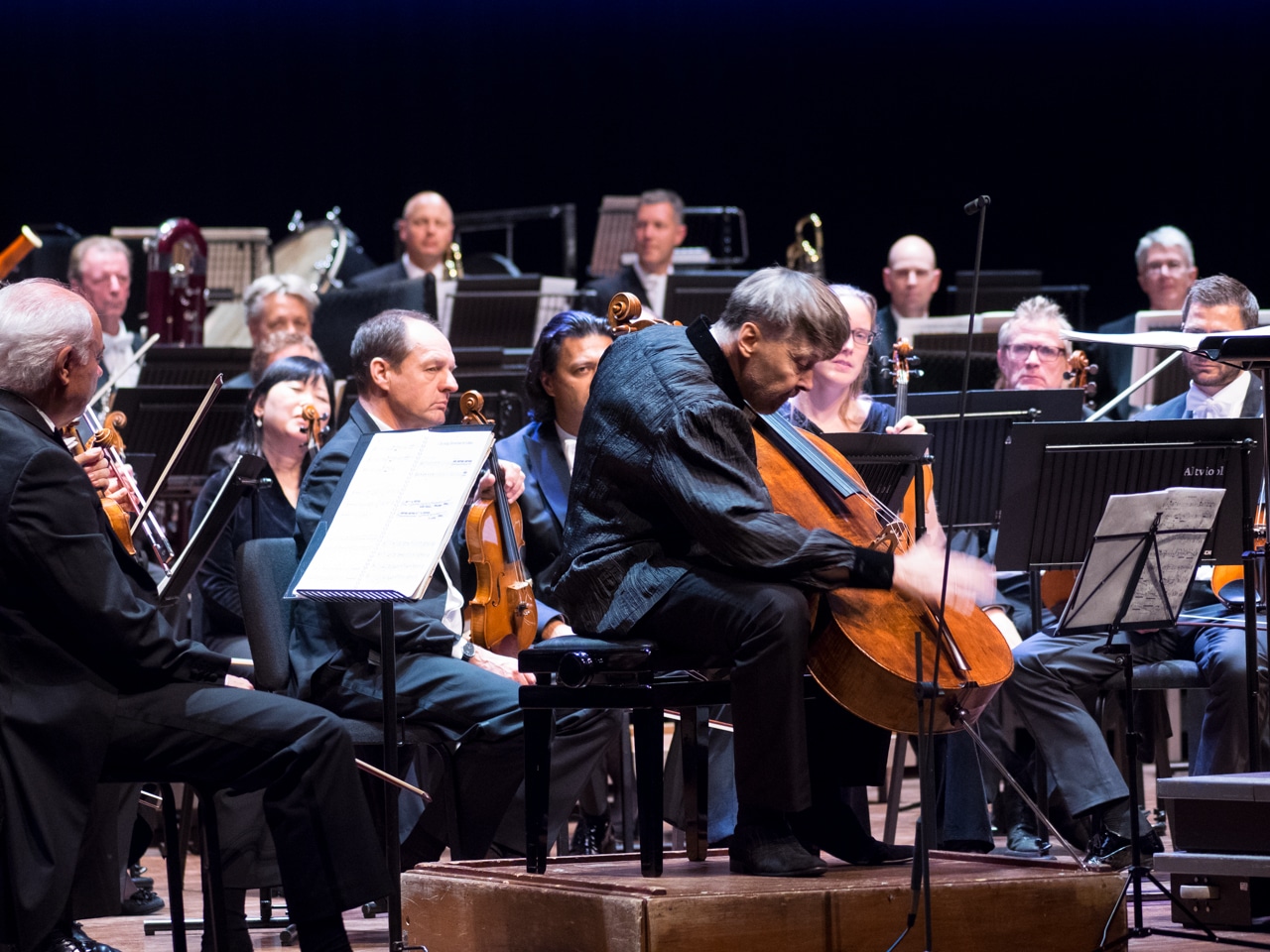'He likes a joke,' says Fedor Teunisse of Slagwerk Den Haag, calling composer Brendan Faegre (1985) onto the Bimhuis stage. The young composer tells how the percussionists and the Biennale Cello Band are Magical Quest for the Enchanted Armor have to perform. 'It's a game piece,' he says enthusiastically. 'The four percussionists and four cellists have to choose a route in pairs through musical fragments, which can be reached by different routes. Whoever gets to the treasure first gets to decide the final phrase.'
His witty piece, in which repeating rhythmic motifs of the cellos are supported by swinging drums and deliberately dickish melodicas, is part of the One Page Project. This is an initiative of Slagwerk Den Haag and the Cello Biennale and is inspired by In C from Terry Riley. With this composition consisting of just one page, the American fired the starting pistol for minimalism, which is still popular today, in 1964. Five young composers were commissioned to compose a piece that would fit on one sheet of paper.

What does a moth sound like?
The concert exudes the spirit of the Minimalism-affiliated Fluxus movement. In the 1960s, this movement blurred the boundaries between visual art and music with conceptual, Dadaist-inspired music. performances. In 1960, for example, La Monte Young wore in Piano Piece for David Tudor #1 'feeding' the musician on his piano with a bale of hay and a bucket of water, and in #5 he has to release one or more butterflies in the concert hall. In our country, in 1964, an artists' collective organised the Concert for sandwiches at the Kurhaus.
Pete Harden (1979) comes closest to this approach in Preservation (Madagascan Sunset Moth). His composition consists of two pinned-up moth butterflies. When asked, he reported that the musicians are allowed to shape their interpretation entirely as they see fit. They decided to create a piece in two parts, one for each butterfly, with the cellos 'sounding the outline of the butterflies and the percussionists the branches of their veins'. With softly squeaking glissandi and rustling percussion, the musicians miraculously indeed manage to create a dark, moth-like atmosphere.
Ink drops and squares
Scottish Genevieve Murphy (b 1988) stretched her page to 25 metres and called her piece The First 4 Minutes: 'I was only allowed to fill five minutes, so I could only run 12 metres,' she says with a sardonic smile. She had walked along a line for 12 hours straight with a metronome in hand. Occasionally, she dripped some ink onto a sheet of paper and translated the outcome into musical notes. The result is sometimes mesmerisingly beautiful, with soft plops from the percussion versus sonorous sounds from the cellos, but as a whole sounds somewhat random.

The same applies to Variations on a Field in C by Hilary Jeffery (1971), who drew sixteen squares on his sheet, filled with vertical and horizontal lines. 'I wanted to write something bright and simple,' he says. Each square should last a maximum of 30 seconds; the atmosphere should be 'a bit zen'. And there again are the obligatory plops and plops, glissandi, flageolets and pizzicati, otherwise performed with admirable dedication.
The most fun is Biennial Galop by 'old hand' Martijn Padding (1956), who gives his musicians real notes to play. It opens with a firm slap on a rattle and tinkling sleigh bells. From this, a swinging rhythm develops with loud, syncopated strokes over a rasp. There are also "false" tunes on melodicas, while clattering coconuts conjure up images of trotting horses. All this is larded with cowboy-like exclamations and a kind of cow mooing, so that you imagine yourself in the middle of an American prairie.
String mists
The evening concert in the Great Hall of the Muziekgebouw aan 't IJ was opened by Cello8tet Amsterdam with Symphony for Eight by Philip Glass. His infectiously pulsating triadic motifs were marred by the first cellist's poorly intoned solo lines, which from time to time dragged his colleagues along.
A breath of fresh air after this was the Rotterdam Philharmonic Orchestra, which, led by conductor Joshua Weilerstein, gave a spot-on performance of Rob Zuidam's new Cello Concerto. The three movements are named after prints by Dürer and the concert opens with a sigh from the cello in 'Melencolia'. The soloist then plays wistful cantilenes, enveloped by a haze of soft string sounds.

This creates an aura of somewhat alienating harmonies, which sound even more exciting because the strings are often sul tasto (on the fingerboard) and play without vibrato. Beautiful are the - sparse - moments when the woodwinds take over and 'finish' a motif started by the cello.
The following 'Ritter, Tod und Teufel' is brighter in tone, with stopped trumpets and trombones and a soloist, Russian cellist Ivan Monighetti, furiously flogging his strings. When he carelessly hands his bow to one of the first violinists and continues to work his instrument with his hands, laughter rings through the hall.
In the concluding 'Der heilige Hieronymus im Gehäus', the orchestra works towards a climax with a majestic chorale from the brass. Soon, however, calm returns, as does the mysterious mist of harmony that also characterised the first movement. The piece ends with the cellist's dying away flageolets in the very highest register. With this concerto, Zuidam lives up to his reputation as a subtle orchestrator, even though the orchestra's share is minimal and the concerto seems mainly a vehicle for the soloist.
After the interval, German-French cellist Nicolas Altstaedt steals the show with a glowing rendition of Tout un Monde Lointain by Henri Dutilleux. He puts his colleague Monighetti in the shade with his rich and pure tone and with the complete abandon with which he performs this masterpiece. Although Dutilleux also puts the cellist at the centre, he gives the orchestra a larger and more varied role than Zuidam. The Rotterdam Philharmonic Orchestra, under Joshua Weilerstein, once again proves its superb quality.
